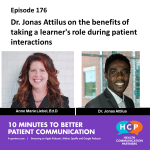Psychiatry Resident Dr. Jonas Attilus returns to the show to tell us why and how he takes the role of a learner during his interactions with patients, and how this helps him to give compassionate care.

May is Mental Health Awareness month, and today we get to hear from Psychiatry Resident and friend of the show Dr. Jonas Attilus. Dr. Attilus comes back and tells us how he takes a learner’s stance toward his patients, and how this helps him give compassionate care.
Hi everyone, this is 10 Minutes to Better Patient Communication from Health Communication Partners. I’m Dr. Anne Marie Liebel. If you want to take your communications to the next level, we’ve got the way. Our continuous improvement process for communication evaluates your communication on 7 important dimensions to help you reach more people. For more information, visit HealthCommunicationPartners.com.
Dr. Liebel: I’m live via Zoom with Dr. Jonas Attilus. Dr. Attilus is a Psychiatry resident at University of Minnesota, Twin Cities. And he was a guest on our show years ago, and his interview episode was the most popular of the year. So Dr. Attilus, welcome back to the show.
Dr. Attilus: Thank you so much, Dr. Liebel. Thank you so much. I am very excited to be back to be honest, and and see what we can share this time, and you know I’m very excited to be here.
Dr. L: Thanks! Our listeners are excited too. I literally had a listener say, “Can you please just let him talk more. We need to learn more from him!” So this is me making good on that. Yes, he’s back! So Dr. Attilus, a lot has happened in the three years, almost three years, it’s been since you’ve been on the show. But the questions have not changed. So can you tell us what is an issue you’re facing in patient communication?
Dr. A: Yeah, I think for us as health care provider, it is very important to provide compassionate care. It is something that a lot of people talk about, people write about. But you know, when the surveys come out, and then patients talk, and they don’t often kind of like reflect what we think we are doing. If we are doing a good job or not. Some of us succeed. But you know, because it’s, medicine is the art and also science.
My next question is, how are you approaching this issue of providing compassionate care in Psychiatry?
Yeah, in Psychiatry and any other medical specialty, it is extremely important to approach our patient as the expert of their own sickness. So we know diseases. We study them. That’s why we go to medical school. So we are the expert on the medical knowledge. But the experience of being sick, the patient is the expert in that. So we need to put ourself in the learner’s role when it’s come to know about what’s happening with the patient. Ask their opinion. Know how they’re doing and how they interpret that. What the impact is in the family and the impact in the community and all that. So there’s a lot to learn from our patient when it’s come to meeting them. So I think that’s where we should start if we want to provide compassionate care.
Thank you so much for that. It’s reminding me of something that another guest of the show, Dr. Paul Ranelli, said–almost the same thing. He was also at University of Minnesota, Duluth campus. There must be something out there in the water! That approaching the patient as an expert, as the expert, is really the stance that he goes into as well. And you just mentioned a few ways that you enact that. Here’s how I approach the patient as an expert: You ask their opinion, you ask for impact on the family or community. And you’re going in there as a learner.
Yeah, yes, yes, yes. Yeah, as a learner, because you cannot learn what you assume that you already know. I think that’s a that’s a quote from, I think, from a philosophy of Stoicism or something like that. Anyway, but the point is, I need to learn. Even though I have seen this particular disease so many times, but probably I’ve not met this particular patient. And the way they experience the illness and the way it impacts them is very different. So I usually start there, like what is your experience. I will ask them anything that you would like from me, from this conversation? And also feeling grateful that patient can trust us with their own stories, with what they understand. Because none of us are entitled to the patient knowledge and their experience. So I feel very grateful. I feel very grateful that they can share those pieces of information with me. And it’s made a lot of difference, you know. So I’m very grateful, and I learn every day from my patients.
I appreciate your, the stance that you’re taking of, “I’m not entitled to your story, I’m grateful for your story.” That’s got to inform the way that you approach patients. So–and when you were here last and we did your interview, you talked about respect and humility
Yes
In your conversations with patients. So I know, just from getting to know you over the years, that that’s something that’s very important to you. So what are you learning from approaching the patient as an expert? From approaching the patient as yourself being the learner? What are you learning from approaching it that way?
Oh, I learned a lot. You know, I can definitely talk about my experience as a Psychiatry resident and also my experience as a medicine intern at some point. So I think for me, when I ask the patient, they share their story with me. And based on the story and the physical signs that I have, and the lab that I have, I’m able to make a good clinical judgment. To have a plan for this particular patient. And also there’s something very particular about psychiatry: those patients help you reflect sometimes in your own life. omebody will share something with you and will will help you reflect about your family, or about the place you live. I can share something: I remember I had a patient who once attempted suicide. And at that moment, they share with me that they couldn’t afford their rent. And it makes me reflect: What does that mean for somebody to not being able to afford their rent? And I, I, like as a provider, I’m able to do that. So at that moment, I tell myself what I’m going to do with that privilege right now. So that’s one, one way I can learn something from a patient. And other times, somebody will trust me about, you know, people taking advantage of it. them. And that helped me reflect about my own parents, how they cared for me, how they support me, how they protect me. And that’s helped me reflect about people who are older than me, the elderlys Haitians that I grew up with who are there for me. So it goes both ways, kind of like. The patient never leaves the room without one, teaching me something about Psychiatry, and two, teaching me something about life. So that’s definitely it.
Wow. I mean, what stories and what insights that you are able to access. And I mean, gosh, thank you for sharing that with us. My last question is, do you have advice for people who are trying to also provide compassionate care?
I would say that first of all, I would start from a stand of giving ourselves as healthcare professionals, grace, because the world currently is understaffed. So, so much is being asked from us with very little tools or very little time, a lot of cuts is being done in jobs. So I would start there, like giving ourselves grace that we are doing our best and we’re trying to do our best with what we have in hand. And second, I will say that the patient also is doing their best. Even the patient who arrives very angry at you, very mad. Those are people who have been hurt by the system or who have been harmed. And they bring their best. Their best is kind of like, “I need to protect myself. I need to react. I need to be angry.” And sometimes the patient don’t know there is a much better way. They have not processed the trauma. They have not processed what has happened to them. So they are not sure, or at least they don’t know is there is a better way. And once we know better, we do better. So, I would extend grace to myself. I would extend grace to the patient. And, you know, and also probably I would advocate, too. I would advocate for my patient and I would advocate for better tools. Because compassion is not only you want to do the best. It’s also about being in the right environment. Being surrounded by amazing people, good people. And then trying to do our best. So that’s where I would start.
Dr. Jonas Attilus, Psychiatry resident at University of Minnesota Twin Cities, thank you for coming back to the show.
Yeah, thank you for having me and I’m happy to be back again.
[laughs] I’m delighted to have you here. Wow, I’m gonna be processing this for weeks, what you just shared. Thank you so much.
Yeah, yeah, thank you. Thank you. It was it was so nice to be here and yeah, so nice, yeah.
Thanks again to Dr. Attilus. This has been 10 Minutes to Better Patient Communication from Health Communication Partners. Audio Engineering and Music from Joe Liebel, Additional Music by Alexis Rounds.

